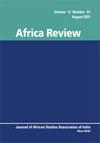Neopatrimonialism in Africa
IF 0.5
Q4 AREA STUDIES
引用次数: 1
Abstract
Neopatrimonialism is a conceptual framework frequently used to analyse state politics. This paper reviews objectivist and positivist literature to ascertain the relevance of neopatrimonialism in analysing African state politics. It defines neopatrimonialism following the Weberian model, as the coexistence of a legal-rational domination and a patrimonial domination over the state. The paper reviews neopatrimonialism through the evolution of the African state since colonisation. It uses the Varieties of Democracy (V-Dem) dataset to assess the prevalence of neopatrimonialism across the world and within Africa. It assesses two propositions to conclude that there can be a “developmental neopatrimonialism” if its practices are regulated but that, inversely, “predatory neopatrimonialism” hinders development. Additionally, the detrimental effect of neopatrimonialism on democracy is ambiguous and democratisation can promote or hinder neopatrimonialism. The paper concludes that neopatrimonialism is a useful research concept if it is specific and able to account for the diversity of practices.非洲的新世袭主义
新世袭主义是一个经常用于分析国家政治的概念框架。本文回顾了客观主义和实证主义的文献,以确定新世袭主义在分析非洲国家政治中的相关性。它将遵循韦伯模式的新世袭主义定义为法理统治和世袭统治并存的国家。本文通过殖民以来非洲国家的演变来回顾新世袭主义。它使用民主品种(V-Dem)数据集来评估世界各地和非洲新世袭主义的流行程度。它评估了两个命题,得出结论:如果“发展性新世袭主义”的做法受到监管,那么它可以存在;相反,“掠夺性新世袭主义”会阻碍发展。此外,新世袭主义对民主的有害影响是模糊的,民主化可以促进或阻碍新世袭主义。本文的结论是,新世袭主义是一个有用的研究概念,如果它是具体的,能够解释实践的多样性。
本文章由计算机程序翻译,如有差异,请以英文原文为准。
求助全文
约1分钟内获得全文
求助全文
来源期刊

Africa Review
AREA STUDIES-
CiteScore
1.80
自引率
12.50%
发文量
22
期刊介绍:
Africa Review is an interdisciplinary academic journal of the African Studies Association of India (ASA India) and focuses on theoretical, historical, literary and developmental enquiries related to African affairs. The central aim of the journal is to promote a scholarly understanding of developments and change in Africa, publishing both original scholarship on developments in individual countries as well as comparative analyses examining the wider region. The journal serves the full spectrum of social science disciplinary communities, including anthropology, archaeology, history, law, sociology, demography, development studies, economics, education, gender studies, industrial relations, literature, politics and urban studies.
 求助内容:
求助内容: 应助结果提醒方式:
应助结果提醒方式:


